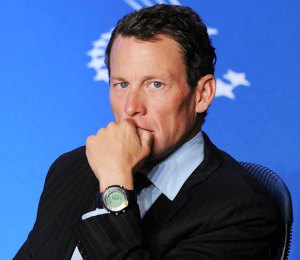I ‘m not going to argue whether or not you should forgive Lance Armstrong or not for taking steroids and lying about it. To me, it’s a farce of the age of celebrity that we would even be asking ourselves that question anyway. It’s comical to read the online comments from people who are angry enough to use ALL-CAPS at some guy they will never know for doing things that had nothing to do with them. Because I’m a pastor, I am going to take this opportunity to say something about grace because Armstrong’s apology and the cynical reaction to it in the media really do illustrate why we need a human community that is grounded in forgiveness.
‘m not going to argue whether or not you should forgive Lance Armstrong or not for taking steroids and lying about it. To me, it’s a farce of the age of celebrity that we would even be asking ourselves that question anyway. It’s comical to read the online comments from people who are angry enough to use ALL-CAPS at some guy they will never know for doing things that had nothing to do with them. Because I’m a pastor, I am going to take this opportunity to say something about grace because Armstrong’s apology and the cynical reaction to it in the media really do illustrate why we need a human community that is grounded in forgiveness.
I’m not sure what I would have done if I were Lance Armstrong. It sounds like almost everyone in cycling was doing what he was doing. We have such a vested interest in our fable of meritocracy as Americans that the most infuriating thing that can possibly happen is to find out that the best really wasn’t the best. Of course, all of us try to game the system when it’s our kid who’s supposed to be the best soccer player or community service volunteer or standardized test-taker. We use whatever wealth advantage we have to buy Kaplan classes or top-notch summer sports camps or whatever else. But we draw a line at anything that involves needles. Needles are unclean to the bourgeois ethos. If you use needles, then you’re not just doing what everyone else is doing to get ahead; you’re cheating (not that I dispute this; it’s just interesting where we draw the line between advantages due to privilege and all-out cheating).
I am very resistant to the the idea our media has created that one major sin delegitimizes not only everything that a particular person has ever done but also everything that person has ever touched. I guess the argument is that if you’re dishonest about one thing, you were probably dishonest about a lot of other things. I can somewhat understand that logic. But Lance Armstrong’s lies don’t mean that everything he has ever done was evil. We are all complicated human beings who show many different sides of ourselves to different people.
Even though Armstrong was insistent on maintaining a big lie as part of his public persona, that doesn’t mean that everything he said when shaking hands with somebody was a lie. It doesn’t erase whatever gold medals kids were inspired to win after they heard Armstrong give a speech about beating cancer. Those kids shouldn’t have to give their medals back too. A lot of people in the cancer community resent Lance Armstrong for tarnishing the ability of the Livestrong foundation to fulfill its mission. I resent the mentality that would black-ball an organization not on its own merits, but for the actions of a celebrity figurehead over which it had no control.
In the cynical mindset of the information age, you cannot apologize for your actions without it being an “image rehabilitation strategy.” I’m just glad that Jesus doesn’t operate that way. When we cry out to Him, He doesn’t say, “Oh, so now you’re going to ask me for forgiveness. Let me count how many ulterior motives you have for doing that.” Jesus just wants us to be liberated from our sin and move forward. He was definitely a hard-ass with people who were trying to make excuses for their behavior. But He had nothing but encouragement for people who took the first tentative step into repentance.
On the day that Jesus had lunch with Zacchaeus the scoundrel tax-collector, we don’t know how genuine Zacchaeus was being when he said he would make it right with all the people he had ripped off. He was probably trying to impress Jesus. Maybe he said it after he’d had a fair amount of wine. Maybe he didn’t follow through with as extravagant a grandiosity as he promised. But Jesus said, “Today salvation has come to this house.” And Jesus’ powerful affirmation of Zacchaeus’ first steps toward an honest life probably helped to seal the deal.
I hope that Armstrong has some people in his life who will stand by him no matter what. Being a pastor, of course I want him to meet Jesus if he hasn’t already. I’m sure that if he has a conversion experience, then the pundits will say that’s just another part of the image rehabilitation strategy. I just hope he’s able to make peace and find a community where he can start over and share his gifts in a meaningful way. That’s really what we all need, and even though you might consider this to be a shamelessly opportunistic exploitation of a public event for me to say, it is what the body of Christ has to offer.











